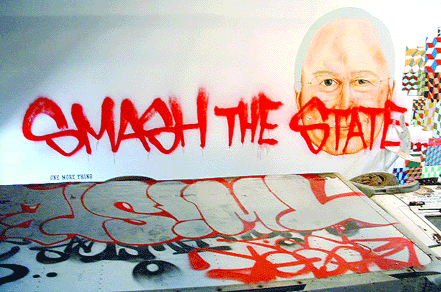Barry McGee lends voice, backbone to an ignored American spirit
From street culture to car crashes, Barry McGee’s installation “One More Thing” at Deitch Projects captures the ethos of a dispossessed, downwardly mobile, crapped-out American culture.
The installation assaults the senses, from the entrance, which is through the back of an overturned truck, into the main gallery dominated by a car crash pile-up, video monitors stacked and buzzing. A rhythmic beat drones on from an unseen source. “SMASH THE STATE” is spray-painted across a large portrait of Dick Cheney.
In the back of the gallery is a reproduction of a graffiti-covered public toilet. Covering the walls of the entire space is an expanse of panels with vibrating colored patterns, full of grim-looking caricatures, potbellied and with smirking morose expressions. Atop one car crash is an animatronic totem of five life-size figures stacked upon each other’s shoulders. The figure poised on top of his friends spray paints the word “amaze” on the gallery wall.
McGee’s work responds with disdain to the assault of global advertising propaganda and contains a very American expression of radical optimism. From his roots as a graffiti artist in the 1980s, skating and surfing culture of San Francisco, McGee taps into a diverse artistic lineage. An affinity with artists such as Jean-Michel Basquiat and Keith Haring is apparent. The socio-political power of David Wojnarowicz, Gran Fury and Philip Guston’s later works also resonate in McGee’s art.
The real strength of the installation can be found in an undercurrent of poetic visual language that balances this spectacle with formal tactics utilized by artists like Bridget Riley or Constantin Brancusi, whose modern interpretation of the primitive totem in “Endless Column” captured the essence of form.
McGee gathers all these giants to stand on their shoulders and “tag” a vision of contemporary life on the streets and on gallery walls, a vision of America conveyed through a gritty urban vocabulary. This urban language is particularly relevant today, since nearly 80 percent of Americans live in urban communities; communities where economic disparities and social struggles are pervasive and yet ignored across a landscape of billboards and branded public spaces.
McGee’s rebellion through graffiti and installation gives a voice to an apathetic and ignored America and offers a resilient call for resistance.
gaycitynews.com



































